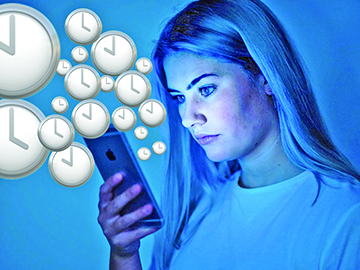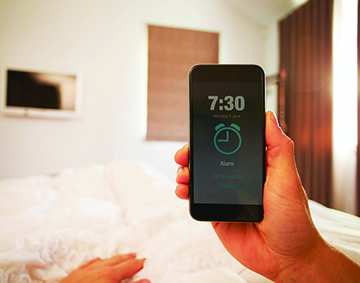“When we clutter our lives with imagined obligations, unnecessary activities, and distractions that only kill time, we dilute the power of our lives.” — Anne Katherine
For the last 200,000 years, the human psyche has been overarchingly concerned with the physical world — aka the Outernet.
Even after the invention of the printing press in 1440, the focus of most humans was on food, water, shelter, weather, the changing seasons, the nighttime sky, flora, fauna, and other groups of nearby people.
The fascination with inward worlds, other than stories passed on through hieroglyphs and the oral tradition, most certainly began with the written word. Yet, it did not explode across the mindscape of civilization until complex ideas could be produced en masse. While the printing press has most certainly been an inimitable tool in the furthering of civilization through the sharing of information, it also gave rise to the desire for an ever more efficient way of exchanging ideas.
Progress In Overdrive
Then, in the 1990s, the rising popularity of a global computer network — aka the Internet — began to deliberately eclipse the Outernet. In a span of less than 30 years, this phenomenon has completely changed how most Americans interact — not only with each other — but with the world around them. For some, the importance of the Outernet is becoming increasingly dismissed, as folks who are immersed in the digital world delve deeper into a set of stimuli which the human brain and nervous system are not equipped to handle on a full-time basis.
In scenarios of extreme overuse — such as video game addiction — too much screen time can ruin your life, and at the very least, can waste large portions of it while infecting you with twin cases of depression and social ineptitude. Yet, just as the bastard children of the printing press are tabloid newspapers, social media platforms are the unholy spawn of the Internet.
According to a June 2021 report on a study performed by the Reboot Foundation, “There is a disconnect between how people see the impact of social media on society and how they view it on an individual level. Despite their concern about social media’s impact on public mental health, most individuals seem ambivalent about the role of social media in their own lives. To put it bluntly, everyone seems to think their own relationship to social media is healthier than the average. This was clear in the survey. Over 70 percent of users said they would not give up their social media accounts for less than $10,000. Even more surprising, more than 40 percent said they would give up their TV, car, or pet before they disabled their social media pages.

Instead of gaming, thumb-typing, and scrolling all day — you can learn music or do something otherwise productive.
But despite being open to giving up Fido for Facebook, only about a third of respondents reported taking steps to limit their social media use, like turning off phones periodically or limiting content on their feeds.”
A Host Of Hindrances
While social media and gaming are among the most popular Internet/screen time fixations, these activities are rivaled (and accompanied) by instant messaging, email, gambling, watching videos, shopping, banking, streaming music, swiping through dating apps, and the list goes on and on. Plainly put, many people are spending too much time online and in front of LED screens. In doing so, they are becoming increasingly depressed and unable to effectively interact with the Outernet. Thankfully, there are a few strategies which, if applied deliberately, can help you extract yourself from the digital world and rediscover the other world that has been waiting just outside your field of vision.
Wake Up With Analog
Before you go to bed, consider turning your phone off for the night and using the antiquated yet time-tested method of awakening to an alarm clock. This way, you can remove the temptation of scrolling through your Instagram feed as you lay in bed at night and waking up to a bunch of notifications of things that happened while you were asleep.
Turn Them Off
Speaking of annoyances, if you disable your visual and audible notifications permanently, you can minimize how often you are distracted by an incoming email, a social media like, or an instant message. By doing so, you can take back autonomy over your time and your ability to focus on the task at hand rather than constantly being pulled away from what you are doing by tiny digital signals.
Put It Down
Whether your smartphone is glued to your hand 24/7, or if you are a semi-casual user, it is important to look forward while crossing the street, to drive undistracted, and to take in a sunset without checking your email. Plus, if you go for a walk without your phone, you might end up having a conversation with a neighbor, watching the fall leaves flutter down from the tree branches, or avoid walking into one of these trees because you’re staring down at your phone.
Replace The Habit
If gaming is becoming a full-time fascination and you haven’t showered for a week or seen the sun for as long, perhaps it’s time for a new hobby. Since you love the competitive, exciting nature of video games, consider hiking, martial arts, team sports, or regular trips to local amusement parks. If you’re a computer nerd at heart, perhaps applying your aptitude by learning to write code is a viable pursuit. If your imagination craves stimulation, you can forgo your Instagram feed for a dip into a thick, handheld piece of fantasy fiction — aka a good book.
Use Your Hands
Incessant scrolling, texting, and game console handling are all manual skills which take repetition and coordination to develop. What they do not develop, however, is an auditory talent which can help you connect with others. Rather than twiddling with your phone and fidgeting with your keyboard all day, consider learning to play the guitar, the piano, the harmonica, or some other musical instrument. These highly cerebral endeavors have much of the same effort/reward effect as gaming without the negative, addictive elements. Plus, playing music carries a far more long-term sense of accomplishment and fulfillment than just about any online activity.
It is a fact that the Internet is here to stay and is essential to the functions of modern life. But the Internet is predated by the Outernet, which the human psyche is far more attuned to for achieving genuine happiness and personal fulfillment. By all means keep your phone, just turn it off every once in a while, gaze out the window, and see what happens.




